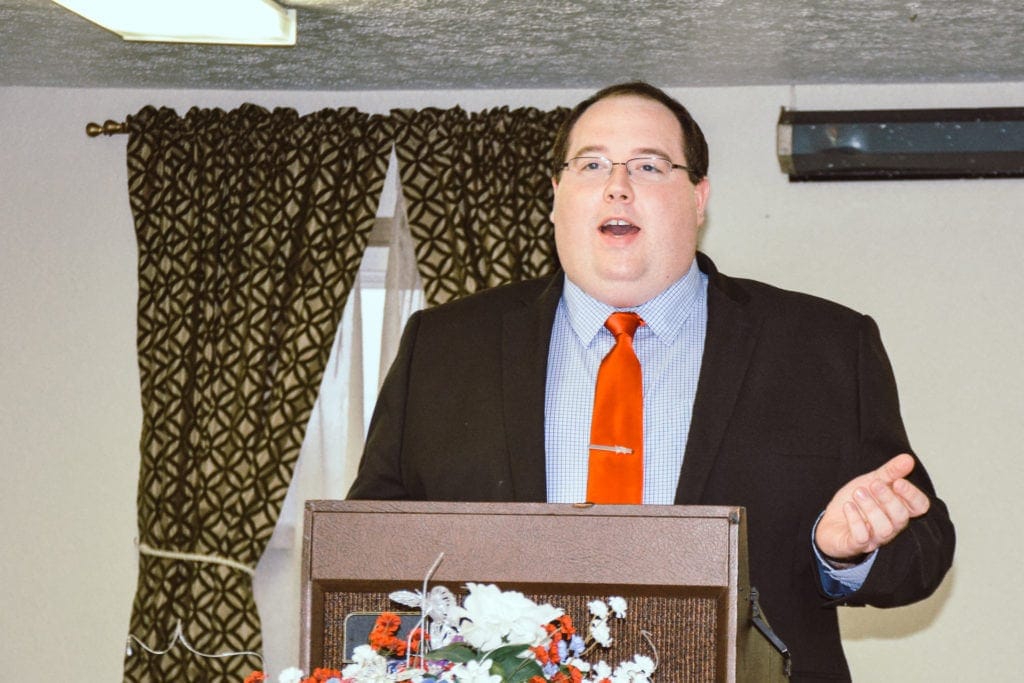BUCKHANNON – Upshur County’s freshman delegate briefed the Central West Virginia Republican Women’s Club Monday on the 2019 legislative session.
Del. Carl “Robbie” Martin, R-45, discussed some of the legislative achievements of which he was most proud at the club’s 6:30 p.m. meeting Monday at the 88 Restaurant & Lounge.
“We passed 289 bills, which is actually one of the largest in history,” Martin said of the Legislature’s regular session, which wrapped up March 9. “They’re checking to see if it’s the largest ever, but I know back to 2004, the largest was 280, so we did accomplish a lot of bills during the session … and the governor has up to 18 days to veto a bill, and if he doesn’t, even if he just lets it sit there, it does go ahead through.”
The first accomplishment Martin touted was House Bill 2001, which removed personal income tax from Social Security income.
“One of the things that we did in the Legislature this year is we enacted significant tax reforms, including the elimination of personal income tax on Social Security income, which was House Bill 2001, and it’s accomplished over a three-year phase-out,” he said, “so after three years, anyone making any money from Social Security, that tax is now gone.”
Martin said the Legislature also passed a bill that grants tax credits for new coal investment and reduces the severance tax on steam coal (thermal coal), lowering it from 5 percent to 3 percent.
And despite the death of the controversial Senate Bill 451 – commonly known as the omnibus bill – Martin said the Legislature has already factored a 5 percent increase in compensation into its 2019-2020 budget for public school teachers, school service personnel and state employees.
“We continued improving compensation and benefits for teachers, service personnel and state workers,” he said. “We’re currently called into Special Session from the governor. We did, though, happen to put a 5 percent pay raise in the budget. We have not passed something already for that, but we have already allocated the funds to be able to do so.”
Martin highlighted House Bill 2005, which enacted the Broadband Expansion Act of 2019.
“It will encourage development and expansion of the latest generation broadband internet and highspeed wireless technologies across the state,” he said.
Additionally, Martin noted state legislators “have diverted more funds for secondary road repairs.”
“I’m sure where some of you have seen the governor requested for the heads of the DOH to give him a list of all the roads that need to be repaired and the severity,” Martin said, adding that on his official delegate page, he asked for – and received – the names of secondary roads in Upshur County that could use some patching up.
“I want to make sure that Upshur County has a comprehensive list that is sent to the governor … the more roads we have, the better we’re going to get treated here in Upshur County,” Martin said. “I received hundreds and hundreds of road updates, and people sending pictures in. I think 7,000 people interacted with that post. It was a more extensive list than what I thought I would be creating.
“I think that’s going to be a major thing, and I’m sure we’re going to be looking at that even more next year.”
Additionally, Martin mentioned House Bill 2010, which deals with restructuring West Virginia’s foster care system, and Senate Bill 1, which pertains to increasing access to career education and workforce training, as significant accomplishments.
According to Charleston Gazette-Mail reporting, HB 2010 includes a provision that would transfer West Virginia’s foster care children and those receiving adoption assistance under the purview of private managed care organizations. Martin said the bill will also keep kids in foster care closer to their original homes.
“One of the big things was a lot of kids were being sent out of state, and that was the one big thing that we tried to change – to keep kids in state closer to where they’re from.”
“We also expanded access to community college, technical schools and workforce training opportunities,” Martin said, referring to Senate Bill 1.
“That will add $12.8 million in additional funding for four-year colleges and universities and roughly $5 million more for community and technical colleges,” he explained of the career education and workforce training bill. “Those are some of the major things that was did in the House and the Senate that I was proud of.”
Martin noted the upcoming 2019 special legislative session will focus solely on education.
“House leadership is asking for delegates to spend these past few weeks on attending meetings with the affected parties, including teachers, service personnel, parents, business owners, boards of education, so meeting with all different kinds of stakeholders before we go back to the Special Session,” he said. “I don’t know yet when we’re going back down to Charleston. We have not been informed of that.
Martin was asked several questions following his presentation, including what happened to his bill that would have diverted $10 million of West Virginia’s budget surplus to President Donald Trump to help build a wall on the U.S.-Mexico border.
“It didn’t go anywhere,” he said. “It was more of us saying, ‘we have a drug problem in West Virginia,’ and there are 1,000 ways to combat the drug issues. Our biggest thing was, I spoke with law enforcement officers and officials. I spoke with judges. All of them told me – 90 percent of the drugs that are coming into West Virginia are from Mexico. It used to be, we’d have all these meth lab busts in our state.
“Well, now, it is more pure and cheaper for those drugs to be coming from Mexico to here than it is for them to be making it here – and that’s any drug, it’s all coming from Mexico, the majority of it is. We wanted everyone to know how important the wall that Donald Trump wanted – that Donald Trump wants – how important that is to our state and how our state is affected by this as well.”
“It’s not just border states that are dealing with this influx of drugs,” he added.
Martin was also asked why the House of Delegates did not support the education omnibus bill, SB 451, which teachers and school system personnel protested by calling for a work stoppage.
“The Senate brought it over, and most people deemed it as a little extreme,” he answered. “The reason that the House did not concur was that there was zero Democrat support. Now, they swayed enough Republicans to go against it [table it] in the House.”
Martin said delegates opposed SB 451 for varied reasons.
“Everyone has their own reasons; it just depends,” he explained. “Someone might say, ‘well, there’s no way I’m voting for charter schools.’ We try to make compromises, and if the Senate would have concurred with the House version, it would have passed, but the Senate did not want what we sent back to them.
Martin himself voted to table to bill.
“It was a difficult decision,” he said. “It really was. When it came down to it, I did vote to table it … I was hoping for more time to go over the bill. It was a 136-page bill, and not everyone understood the ins and outs of the bill because it was definitely difficult to understand everything that was in that bill.”
The Central West Virginia Republican Women’s Club meets on the fourth Monday of each month in the second-floor meeting room of the 88 Restaurant & Lounge. Club president LeVera Gillum invites anyone interested in becoming a member to attend future meetings.













